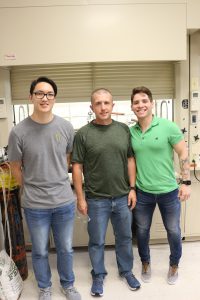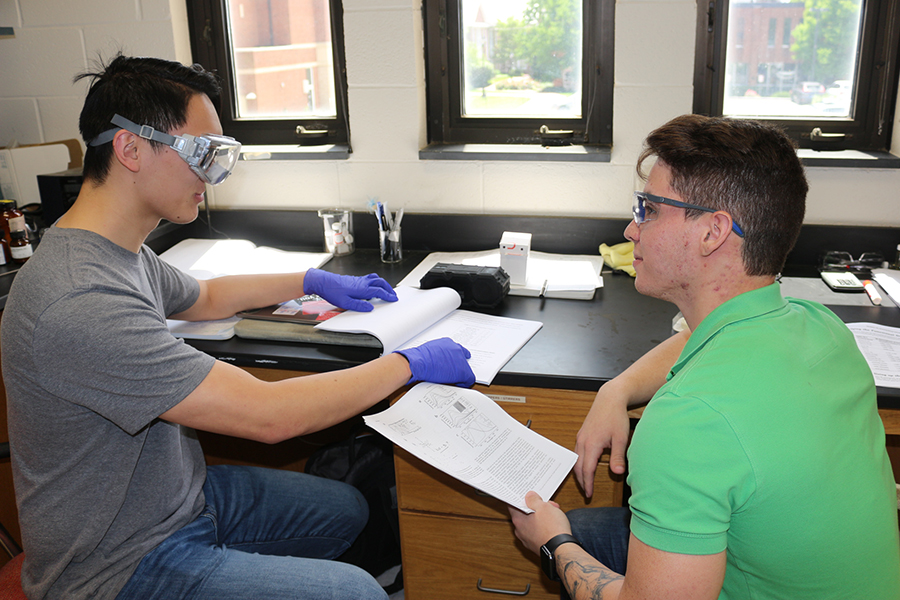A pair of Elizabethtown College students are running experiments and providing key contributions toward a long-term chemistry research project in a Musser lab this summer while growing as critical thinkers and aspiring scientists in the process.
The independent student research and collaboration with an Etown faculty mentor is part of the Summer Scholarship, Creative Arts and Research Projects (SCARP) program.
Title of Research
Luminescent Metal-Organic Frameworks for the Detection of Alcohols
Student Researcher
Lucas Stehle ’22 – Chemistry
Brandon Molina ’23 – Biochemistry and Molecular Biology
Faculty Mentor
Jeff Rood, Associate Professor of Chemistry
What are you researching?
Lucas: I work on making Luminescent Metal-Organic Frameworks, or LMOFs for short, which are a type of Metal-Organic Frameworks (MOFs). MOFs have a few applications like small molecule storage, catalysis, and analytic sensors. LMOFs are given a luminescent character by incorporating a luminescent transition metal complex into a MOF. We then study how different solvents affect the luminescent character of the LMOF.
Brandon: We expose these different structures to solvents, in this case, alcohol. This gives us an idea of what their luminescent behavior is in the presence of that specific alcohol. 
Why did you choose this topic?
Lucas: I am very intrigued by the combination of inorganic chemistry and analytical chemistry. The research I am doing is fascinating and exciting. I’m gaining valuable research experience as well.
Brandon: I found it interesting how with the use of MOFs (Metal-Organic Frameworks), we could create massive structures that, in the presence of a certain analyte, would emit fluorescent light. These structures have many different applications, and I wanted to explore as much as I could in this topic.
What is the most interesting aspect of this research?
Lucas: The most interesting part of the research is looking at how the solvent affects the luminescence of the LMOF.
Brandon: The most interesting aspect of the research is using all the different instrumentation, like Infrared, NMR, and Fluorescent spectroscopy. Using these techniques helps me further develop my data interpretation skills that I will need for graduate school.
How has Dr. Rood helped you throughout this experience?
Lucas: My mentor, Dr. Rood, has been instrumental in my growth in research. He is always around to answer my questions. He helps me understand the underlying science and shows me how to use different instruments as well.
Brandon: Working with Dr. Rood has been a great opportunity. He took the time to show me the basics of the project and asked me in what direction I wanted to take the research project. After I understood the project and the techniques that it entailed, he gave me the independence to decide what and how we might do certain things. This independence has helped me to grow as a critical thinker and aspiring scientist.
Hear from the Faculty Mentor – Jeff Rood
“Brandon and Lucas work on different facets of a broad research project that has been going in the lab for several years,” said Rood. “Lucas has run some experiments this summer that should help us to publish some of the results from this project in the near future. Brandon has worked out a new synthesis for a compound that we use regularly in the project that gives us much better yields in a shorter timeframe, so that has been a big help to everyone working on the project.”
“SCARP is a great time to have students focus on the research process,” said Rood. “I find that students tend to make good progress and it often sets them up for continuing meaningful work when they return to campus in the fall semester. It is also a great opportunity to build community within the department and the broader campus.”

